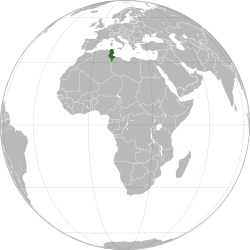Tunisia: Fears Grow Over Salafist Violence
By Magharebia
By Monia Ghanmi
Seventy-eight per cent of Tunisians fear salafists’ growing sway and say that extremists pose a danger to Tunisians’ personal freedoms, especially freedom of belief, according to a poll released on Sunday (September 30th).
To reach the conclusions, online research centre Tunisie Sondage interviewed 2,570 Tunisians from different social categories. Eighty-eight per cent of respondents said that salafists threaten freedom of expression in the country.
The results came amid multiplying acts of violence by Islamist extremists, the latest of which was the September 14th attack on the US embassy in Tunis.

“All that those people want is to impose a medieval pattern of life using violence and coercion on a modern society that rejects violence and extremism,” Slimane Mahmoudi said.
Eighty-seven per cent are worried about their country’s future if the government does not rein in radical groups. They said that Tunisia’s political life would be controlled by salafists if their violent acts were not contained.
Respondents accused the current government of not being firm in dealing with salafists’ violations, with 55% saying that acts of violence tarnish Tunisia’s image overseas.
“The government hasn’t taken the necessary steps to put an end to this scourge; something that enhanced their [i.e. salafists] human capabilities and encouraged them to increase their violent activities in a society clinging to moderate and enlightened Islam,” according to 82% of survey participants.
Ibtissem Mkaouer demanded that the government protect Tunisians’ security and enforce the law.
“It also depend on the Tunisian people to stand like a bulwark in the face of this attack which is led by those extremists with their obscurantist thoughts against the gains of modernity that all Tunisians are proud of,” she said.
Government officials, however, also express concern over salafists’ audacity.
“Before we thought it was a minority and they have very few people and they are not dangerous. But now we realise that they are very, very dangerous,” President Moncef Marzouki said on September 23rd in New York.
“Our police estimate there are just 3,000 of these salafists in the country of 10 million,” he said. “There was a lack of security measures. We didn’t expect those people to be so violent. Now it is a signal that we have to stop the phenomena because otherwise they are harming the image of the country,”
Prime Minister Hamadi Jebali acknowledged in an interview with a state-run TV station last Friday that Tunisian society was threatened by violent and extremist groups and pledged to fully confront all types of violence targeting citizens.
In his turn, Ennahda leader Rachid Ghannouchi condemned the extremists’ attack on the US embassy. He said, “Those people don’t pose a threat to Ennahda alone, but also to public freedoms in the country and its security. Therefore, everyone must counter them through legal means.”
According to political analyst Noureddine Mbarki, salafists benefit from their “public presence” to gain influence without “partaking in the political process”.
“This was shown through the salafists’ control of many mosques, their participation in the battle over niqab at the Tunisian university, and their social activities in many poor districts and impoverished internal areas,” the analyst explained.
